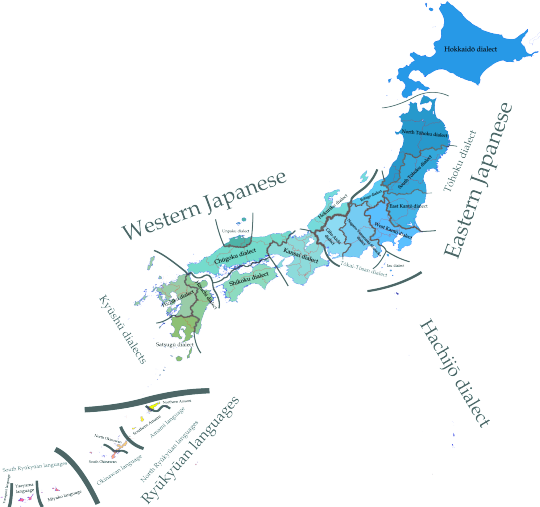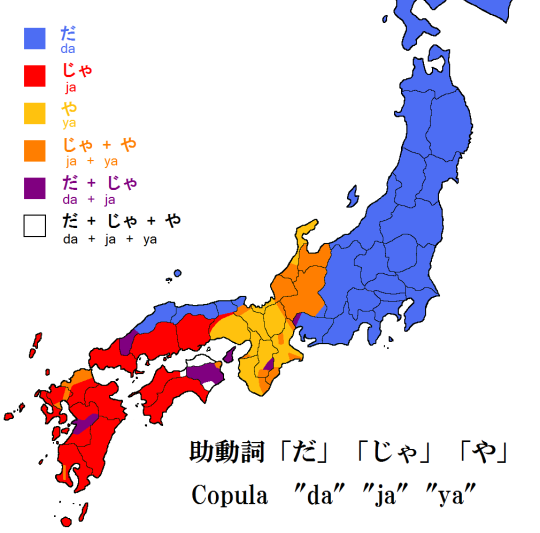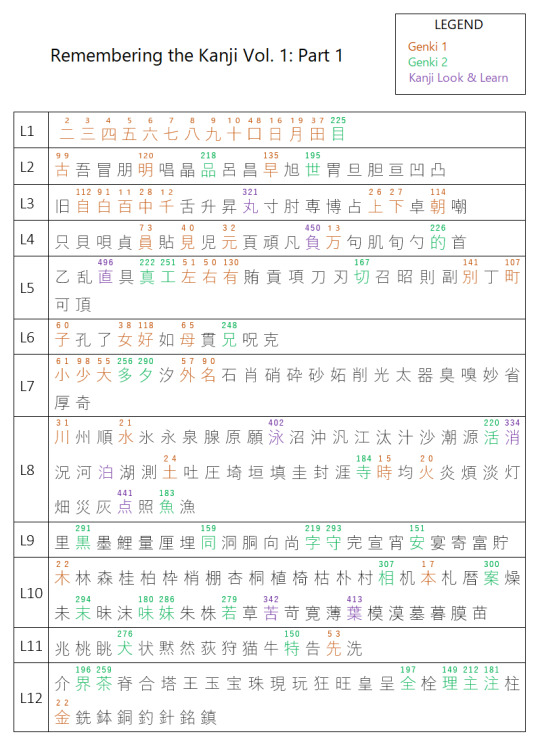I post fashion and generally sjw things. I also enjoy cultural diversity so expect those posts. 24 M
Don't wanna be here? Send us removal request.
Text
Japanese Dialects Masterpost

Dialects can be fun and offer cultural insight. They may be useful to learn, though usually only if you have geographical links to a specific area of Japan- perhaps you have family there, personal heritage there, you live there, or are going to do a language exchange in a specific area. Linguists may also be interested just because they are really interesting.
In almost all instances for non-Japanese people learning to understand a dialect when it’s spoken/written (rather than produce it in your own speech) would suffice for communication. As far as I can see the best reason to learn to actually speak a dialect is because you want to communicate with elderly people from that region specifically; most young people have had far more media exposure so they can easily use ‘standard Japanese’/ Tokyo dialect.
If a non-native Japanese speaker learns a dialect and can’t speak standard Japanese, they may find they are seriously limited in conversations and people will inevitably find it weird. They might just find they are incomprehensible:
’I spent three years living in Nemuro, the easternmost town in Hokkaido. […] Hokkaido-ben is often misunderstood outside Hokkaido, Nemuro-ben can’t be understood even in the next town over. So it’s basically useless unless you’re planning a trip to Nemuro (which I would recommend.) However, it does show how many variations there are in dialect, even within one island.’ [Tofugu, my emphasis]
Someone with a low communicative ability in English who could only speak using Cockney rhyming slang, but didn’t know standard English unfortunately would sound ridiculous to natives of that area. It would seem crazy to know ‘You’re ‘aving a bubble mate!’, but not ’You must be joking!’. They’d sound odd and in many instances their language would sound antiquated. Be aware that you may well get a similar reaction if you pepper your speech with regional dialect as a non-Japanese person without being conversationally fluent in standard Japanese. I’m not saying don’t learn dialects, please do if they interest you, learning to understand them when you hear them, rather than necessarily use them in your own speech, is a great idea. If you want to speak in them, please try to do it all in good time and in a respectful way that is not accessorizing the language and culture.
For beginners:
Many of the resources here will be only in Japanese, as this post is aimed at higher intermediate and advanced learners. The section below is in mostly English and will give you a general overview if you’re interested:
lingualift article (scroll down past their email sign up stuff to read)
FluentU will teach you a few basic phrases in a variety of dialects
Wikibooks has links to a few examples of phrases in different dialects
The wikipedia article will give you an informative introduction
Tofugu has a few articles on dialects: Hokkaido | Tohoku | Kansai
Japan Times article on dialects
For intermediate and Advanced learners:
I’ve organised this by prefecture, but it’s worth noting that some prefectures contain several dialects and I’m by no means an expert, I hope the Tumblr Japanese learning community can contribute to and help improve this post. General:
Dictionary for dialects in EVERY prefecture
Short animations about various dialects
Women from every prefecture saying I love you in their regional dialect
Japanese dialect Wiki
There tend to be Line stickers on sale for dialects, as people think they’re cute and want to show local pride, try searching the Line sticker store for the dialect you want and you can use them in conversations, which will give you a little practise.
Big Weblio guide to all prefectures’ dialects
方言で話そう on Twitter will show you phrases in a variety of regional dialects from around the country
Project Guttenburg article which gets more into the linguistics of Kansai ben
I made a post on Kansai ben a while back and @similarjapanesewords made a post about it before too
video comparing local variations of the same phrase spoken by native speakers 1 2
This Youtube channel has a lot of different dialect tutorials (all Japanese)
There’s another Youtube channel here too (all Japanese)
hougen-japan
ALC dialect quizzes
The Japanese Wikipedia page has a lot more detailed information than the English page, naturally.
Kansaibenkyou
Maps of where some dialects are spoken
Wikipedia has a lot of basic introductory information on dialects, there are almost certainly dialects I’ve missed from this list, if you search for the prefecture or geographical location and the word 弁 or 方言 then you’re likely to find a dialect, even if it isn’t simply called [place name]弁.
Hokkaidō | Hokkaidō ben dictionary | Hougen.u-biq | Tofugu introducation to Hokkaido ben
Aomori | Goo Aomori ben dictionary | Japanesepod101 1 2 3 4 5 | animation about Aomori ben | Kindle book written in Aomori ben
Iwate | Phrase guide | dialect dictionary
Miyagi | Hougen.u-biq | Vocabulary | Introduction to Miyagi ben | Sendai ben
Akita | Akita ben course | How to use け in Akita ben | How to use こ in Akita ben
Yamagata | A few introductory phrases | Yamagata ben phrases | Yamagata ben dajare | Yamagata ben grammar
Fukushima | Fukushima ben Dictionary | Usage guide
Ibaraki | Ibaraki ben dictionary | Learn Ibaraki ben phrases
Tochigi | Tochigi ben guide to pronunciation and expressions | Tochigi ben dictionary |
Gunma | Five page vocabulary guide | 7 lesson course in speaking Gunma ben
Saitama | North Saitama dialect vocabulary | Phrases | More vocabulary | Saitama ben dictionary on Goo
Chiba | East Chiba dialect | Learn Bōsō dialect | Another Bōsō website | Bōsō dialect quiz | Sotobō dialect guide
Tokyo | dictionary | Tokyo dialect on Jlect | Tokyo ben on Chaku wiki | About Tokyo ben | vocabulary
Kanagawa | 10 phrases | Yokohama and Kanagawa dialect dictionary | Kanagawa ben on chaku wiki
Niigata | Niigata ben dictionary | Japanesepod101 1 2 3
Toyama | Vocabulary | Toyama ben on Wikibooks | Simple phrases | About Toyama ben | Basic introduction to Toyama ben | Toyama dialect competition
Ishikawa | Ishikawa ben Dictionary on Goo | Wikibooks Ishikawa dialect guide | Kanazawa ben guide | English book on Kanazawa ben
Fukui | Fukuiben.com | Hokuriku dialect (spoken in several prefectures)
Yamanashi | Koshu Dialect Laboratory | Koshu ben dictionary | Yamanashi ben on Goo | There are a couple of posts here in English
Nagano | Goo Nagano ben dictionary | Nagano prefecture guide to Nagano dialect | Matsumoto dialect page
Gifu | Large vocabulary list | Mino ben guide | PDF guide with accent information etc | another vocabulary list | Short video in Mino Ben
Shizuoka | Page with links to several local dialects found in Shizuoka | Shizuoka ben version of a commerical | 10 funny phrases
Aichi | Hougen.u-biq | Nagoya ben website
Mie | phrase guide | features of Mie ben
Shiga | large word and phrase list | vocabulary list
Kyoto | Hougen.u-biq | vocabulary list | More vocabulary
Osaka | Hougen.u-biq | video tutorial | Kansai ben/Osaka ben word list
Hyōgo | vocabulary list | Hyogo ben on chaku Wiki |
Nara | Nara dialect on Chaku Wiki | Video discussing the subtelties of Nara dialect within Kansai ben | vocabulary list
Wakayama | Word list | Some honorific expressions in Wakayama dialect PDF | Wakayama ben article | Wakayama Kansai ben vocabulary | Apparently there’ll be a radio show about Wakayama dialect soon so maybe they’ll have a podcast
Tottori | dictionary | large word and phrase list | another vocabulary and phrase list
Shimane | Izumo-ben 出雲弁 | Izumo ben in detail
Okayama | large word and phrase list | Okayama ben corner | Interesting Okayama ben
Hiroshima | Hougen.u-biq | Hiroshima dialect
Yamaguchi | Yamaguchi ben | Vocabulary | quiz
Tokushima | Awa ben video tutorial | vocabulary list | large phrase and vocabulary list
Kagawa | vocabulary and phrase list | phrase list
Ehime | Some Iyo vocabulary | Iyo dialect guide
Kochi | Origins of Tosa ben and Hata ben PDF (bilingual) | Tosa ben introduction | Hata dialect introduction | The Lexicon of Kochi Japanese PDF (academic paper) | Kochi funpage on Youtube
Fukuoka | series of videos on how to use Hakata ben | video tutoiral | verb conjugations
Saga | Saga ben dictionary | Goo Saga ben dictionary
Nagasaki | Nagasaki ben resource with recordings of sample dialogues | Goo Nagasaki ben dictionary | A story book written in Nagasaki ben (available on Kindle)
Kumamoto | How to use Kumamoto ben | Kumamoto ken vocabulary, a lot of these seem rough/rude
Ōita | video | Goo Ōita ben dictionary
Miyazaki | Miyazaki ben explanation | vocabulary and explanation
Kagoshima | Vocabulary | big word list | More vocabulary and phrases
Okinawa | Traveller’s guide to Okinawan dialects | Huge list of Ryukyuan vocabulary | Uchinaguchi dictionary

There are books on dialects, typically designed for native speakers, such as this dialect dictionary, or this Tosa ben guide available in Japan, but you’d need some very advanced Japanese to be able to access them, in which case I doubt you’d be following my blog.
Beyond regional dialects there are also many languages that are native to Japan that are not Japanese. If you’re interested in learning Ainu, one of the Ryukyuan languages, Japanese sign language, or another language from Japan that is not standard spoken Japanese then this Tofugu article may interest you. Many of these languages are endangered. Thanks to these bloggers who helped contribute to this post:
@suzustarlight @tomatograffiti @grapefruitcake Disclaimer: There are a massive number of regional dialects in Japan, I am neither Japanese, nor an expert, so inevitably I will miss some off this list. If you want to share information about a dialect from a part of Japan you’ve visited or lived in please reblog and add some information or resources, so that we can get this post to a point where it’s as comprehensive as possible. Many thanks!
10K notes
·
View notes
Photo

みんな、こんにちは!元気ですか。
最近、仕事は助かれているけど、漢字チャレンジを続けるのが頑張る!げんき1」のレッスン10をまだ始めなかった。週末に始めたい…頑張る!
とにかく、漢字チャレンジが好き!難しくてけど、楽しいも!
–
What I’ve been doing to learn how to recognize kanji:
1. Pick apart the kanji and break it down into its components (also called ‘primitives’ in the RTK method, which are fully indexed on this blog). Reference Japandict and KanjiAlive for radicals to better understand how the kanji is put together. (Why this is easier than trying to memorize all the radicals)
2. Come up with a story that links the kanji’s keyword with its components. If I can’t come up with my own story, check Kanji Koohii and/or Heisig.
3. If the keyword seems odd or hard to remember, copy/paste the kanji into jisho.org to see if there’s a better meaning. Cross-reference this meaning with Heisig’s keywords (using this list) to avoid redundancy. (This article talks about renaming keywords a bit more.)
4. Edit the card in Anki during steps 2 and 3 as needed.
5. Do reviews in Anki.
–
This article incorporates learning how to write the kanji during the above process:
Read through the story and write the kanji down, listing the primitives next to it.
Say the kanji character’s story to yourself aloud while you write it and create a mental image of the story.
Go into Anki and do your review for the day. As you review each kanji, write it out on paper. If you get it wrong, re-read the character’s story, write the kanji out again 2–3 times, and say the story aloud as you write.
I have yet to try this, but I want to give it a shot. Recently, I’ve been growing more and more convinced of the utility of handwriting kanji to help learn them, differentiate them from each other, and make them stick in my long-term memory. (Check out this article!)
–
Additional resources:
https://www.youtube.com/watch?v=sspUdoV9Il0 - A hilarious video by Chris (Abroad in Japan) about the RTK method
https://hochanh.github.io/rtk/rtk1-v6/index.html - Lists all 2200 kanji in volume 1 of RTK (the newest 6th edition) with links containing animated stroke order and stories from both RTK and Kanji Koohi
https://rtkwiki.koohii.com/wiki/Walkthrough - Tips from people who got through the RTK method successfully, organized by lesson
https://www.japandict.com/kanji - Wonderful online dictionary with different search functions, including by radical (what Heisig calls ‘primitives’)
https://kanjialive.com/214-traditional-kanji-radicals/ - Full list of radicals
253 notes
·
View notes
Text
Graded Readers
For the people who want to start reading Japanese but are still at a low level. These are all free ebooks:
KCよむよむ A1 -B2
読み物いっぱい 3 levels
Smith College written by students
Tadoku graded readers (ebooks). you can also download the audio of Tadoku’s print graded readers if you want to practice listening
Jimdo 日本語読本 5 levels
1K notes
·
View notes
Note
How can I learn a language on my own. W/o a teacher and a class you know?
Since I have begun to do this myself, I found that the posts below have been very helpful
Ultimate Guide to Learning Languages
Course books or the internet
What do I need
How do I find the time
Study plan
What should I learn
How much should I study
How to learn words
How to learn grammar
How to be a Better Performer
Languages without Textbooks
How to Learn Many Languages at the Same Time
Studying Multiple Languages at Once
Tips for Studying a Language
4K notes
·
View notes
Text
if you’re reading this
a lump sum of money is on the way to you
845K notes
·
View notes
Photo


Reblog In 5 seconds for good luck
and follow http://gqa1.tumblr.com 😎 😎😎🔥🔥🔥🔥🔥🔥 Lifeofagrinder Snap http://piff.me/1ec8116
2M notes
·
View notes
Text
you have been visited by the seven magic dragon balls your biggest wish will be granted but only if you reblog

1M notes
·
View notes
Text
I think next thursday is gonna be the best day of my entire life tbh
957K notes
·
View notes
Text
you have been visited by the seven magic dragon balls your biggest wish will be granted but only if you reblog

1M notes
·
View notes
Photo


Reblog In 5 seconds for good luck
and follow http://gqa1.tumblr.com 😎 😎😎🔥🔥🔥🔥🔥🔥 Lifeofagrinder Snap http://piff.me/1ec8116
2M notes
·
View notes
Text
you have been visited by the seven magic dragon balls your biggest wish will be granted but only if you reblog

1M notes
·
View notes





